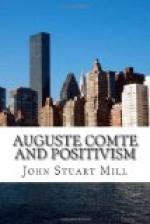reasons, he would cause to be taught, from the age
of fourteen to that of twenty-one, to all persons,
rich and poor, girls or youths, a knowledge of the
whole series of abstract sciences, such as none but
the most highly instructed persons now possess, and
of a far more systematic and philosophical character
than is usually possessed even by them. (N.B.—They
are to learn, during the same years, Greek and Latin,
having previously, between the ages of seven and fourteen,
learnt the five principal modern languages, to the
degree necessary for reading, with due appreciation,
the chief poetical compositions in each.) But they
are to be taught all this, not only without encouraging,
but stifling as much as possible, the examining and
questioning spirit. The disposition which should
be encouraged is that of receiving all on the authority
of the teacher. The Positivist faith, even in
its scientific part, is la foi demontrable,
but ought by no means to be la foi toujours demontree.
The pupils have no business to be over-solicitous
about proof. The teacher should not even present
the proofs to them in a complete form, or as proofs.
The object of instruction is to make them understand
the doctrines themselves, perceive their mutual connexion,
and form by means of them a consistent and systematized
conception of nature. As for the demonstrations,
it is rather desirable than otherwise that even theorists
should forget them, retaining only the results.
Among all the aberrations of scientific men, M. Comte
thinks none greater than the pedantic anxiety they
show for complete proof, and perfect rationalization
of scientific processes. It ought to be enough
that the doctrines afford an explanation of phaenomena,
consistent with itself and with known facts, and that
the processes are justified by their fruits. This
over-anxiety for proof, he complains, is breaking
down, by vain scruples, the knowledge which seemed
to have been attained; witness the present state of
chemistry. The demand of proof for what has been
accepted by Humanity, is itself a mark of “distrust,
if not hostility, to the sacerdotal order” (the
naivete of this would be charming, if it were not
deplorable), and is a revolt against the traditions
of the human race. So early had the new High
Priest adopted the feelings and taken up the inheritance
of the old. One of his favourite aphorisms is
the strange one, that the living are more and more
governed by the dead. As is not uncommon with
him, he introduces the dictum in one sense, and uses
it in another. What he at first means by it,
is that as civilization advances, the sum of our possessions,
physical and intellectual, is due in a decreasing
proportion to ourselves, and in an increasing one to
our progenitors. The use he makes of it is, that
we should submit ourselves more and more implicitly
to the authority of previous generations, and suffer
ourselves less and less to doubt their judgment, or
test by our own reason the grounds of their opinions.
The unwillingness of the human intellect and conscience,
in their present state of “anarchy,” to
sign their own abdication, lie calls “the insurrection
of the living against the dead.” To this
complexion has Positive Philosophy come at last!




